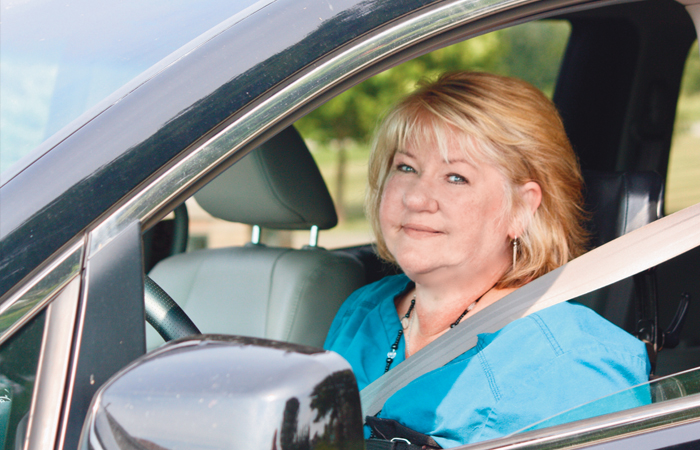
Support System

Medical coder with LGMD lives an independent life thanks to a little help from family and friends
When Cindi Reamer, a 58-year-old auditor and coder with limb-girdle muscular dystrophy (LGMD) was a child in Fort Wayne, Ind., she told her orthopedist that she wanted to work for him one day. At age 20, she did just that. Steven Glock, M.D., hired her as a telephone switchboard operator, and she has been working in his practice ever since, moving from the switchboard into coding.
Holding down a job for more than 30 years as her LGMD progressed has been challenging at times.
“There’s something every year that I could do last year but I can’t do this year,” she says. “I had a huge challenge five years ago when driving foot-to-brake became uncomfortable for me, and I took myself off the road. It was a two-year process to go through vocational rehab, and now I’m finally driving on my own with two joysticks. I should have done it a long time ago, but sometimes pride gets in the way.”
Reamer says she’s able to take on challenges such as driving independently and living beyond limits with the help of her support system.
“My family keeps me moving,” she says. “And the girls at work. I love coming into work because of those girls.”
Reamer explains that on an average day, her husband helps her in the morning, her sister does her hair, and co-workers help her transfer between her wheelchair and her desk chair.
“It takes a village,” she says. “If it wasn’t for my sister and my husband and the lovely ladies I work with, I wouldn’t be working. I also had great parents. My mom and dad were huge supporters.”
All of this support has helped Reamer not only with her work, but also to become a coding teacher at her local community college and participate in MDA events such as the MDA Lock-Up. This year, she raised almost $4,000 for the Fort Wayne MDA office. And while she stays busy with work and teaching, that doesn’t mean she doesn’t make time for some fun.
“I like to go to concerts, I like to travel — I’ve been on many cruises — and I love going to the movies,” she says. “I’m also a knitter and crocheter, and I love to paint pottery.”
Finding Support
You’re not alone in your journey. MDA is here every step of the way, ready to provide resources and guidance, support and ways to connect with others in hometowns across America. To find support, visit MDA's support section.
MDA Resource Center: We’re Here For You
Our trained specialists are here to provide one-on-one support for every part of your journey. Send a message below or call us at 1-833-ASK-MDA1 (1-833-275-6321). If you live outside the U.S., we may be able to connect you to muscular dystrophy groups in your area, but MDA programs are only available in the U.S.
Request Information